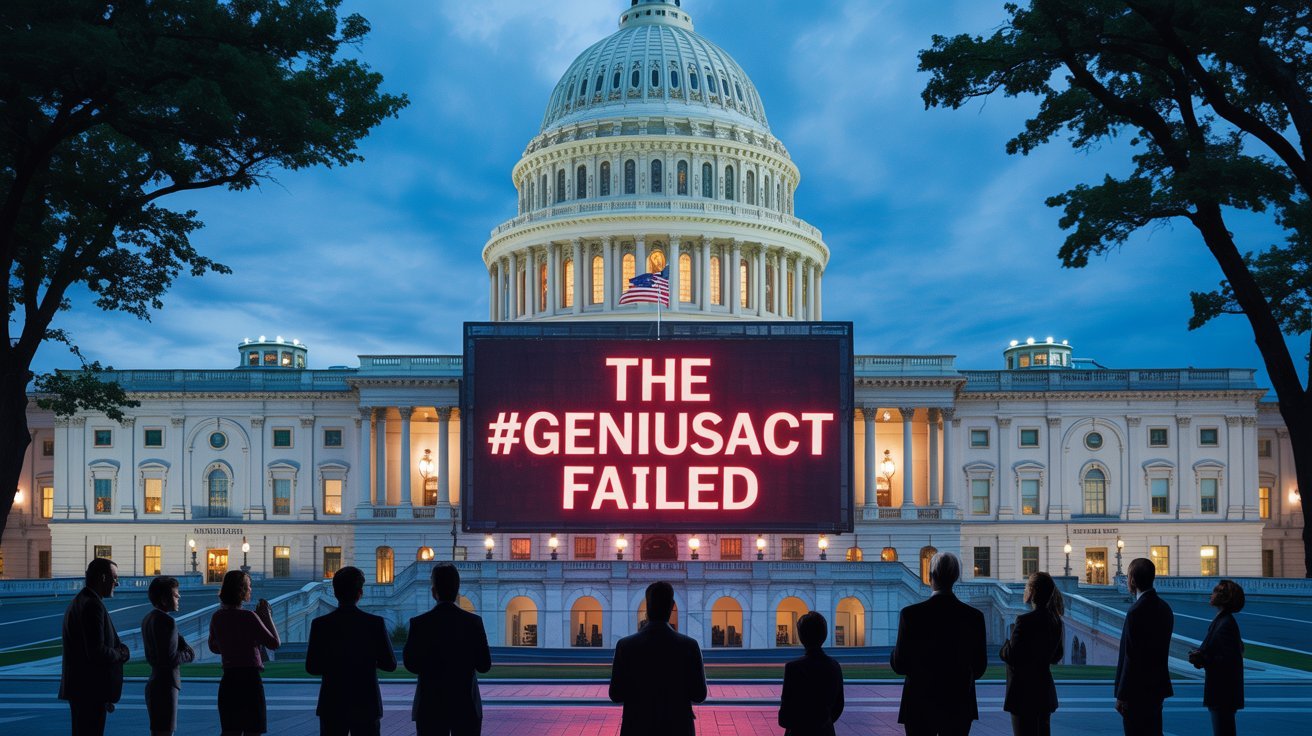On May 8, 2025, the U.S. Senate failed to pass the GENIUS Act 2025, a bipartisan bill aimed at providing regulatory clarity for stablecoins used in payments. Blocked by a 49-48 cloture vote after Senate Democrats withdrew support, the GENIUS Act 2025 failure marks a significant setback for U.S. crypto policy. As stablecoins drive cross-border payments and decentralized finance (DeFi), this stall risks ceding global leadership to regions like the EU.
Nexobytes dives into the GENIUS Act 2025, its implications, and what’s next for crypto. Join our community for real-time Web3 updates!
What Was the GENIUS Act 2025?
The GENIUS Act was introduced as a bipartisan initiative, spearheaded by Senator Bill Hagerty and co-sponsored by prominent senators including Tim Scott, Kirsten Gillibrand, Cynthia Lummis, and Angela Alsobrooks.
The bill’s primary objective was to establish a legal framework for stablecoins used in payments, helping the U.S. dollar maintain its dominance in global finance while promoting responsible innovation in the crypto space.
At its core, the GENIUS Act would have:
- Established clearer definitions for payment-based stablecoins.
- Set minimum standards for issuers.
- Included updated anti-money laundering (AML) provisions.
- Created guidelines for oversight and supervision without stifling innovation.
Why Did It Fail?
Despite early signs of bipartisan collaboration, Senate Democrats pulled their support during the final cloture vote, effectively blocking the bill from advancing.
Sources within the Senate cited concerns over President Donald Trump’s personal and political ties to cryptocurrency ventures, raising questions about potential conflicts of interest and regulatory capture. These concerns were amplified by the broader political environment, where digital assets have increasingly become a partisan flashpoint.
Notably, the bill had already been amended to include stricter oversight for stablecoin issuers, especially around anti-money laundering and compliance obligations, in an effort to accommodate Democratic feedback. However, it wasn’t enough to bridge the trust gap.
Fallout and Reactions
Senate Majority Leader John Thune expressed disappointment after the bill’s failure, stating:
“Democrats have been accommodated every step of the way […] frankly, I just don’t get it.”
The broader crypto industry, which had viewed the GENIUS Act as a measured and focused step toward regulation, reacted with frustration. Many advocates saw the bill as a strategic opportunity to bring legitimacy to U.S.-issued stablecoins, particularly as other countries advance their own regulatory frameworks or central bank digital currencies (CBDCs).
Why This Matters
The failure of the GENIUS Act 2025 highlights several key challenges for U.S. crypto policy:
- Partisan Politics: Crypto remains a politically divisive issue, and efforts to regulate it continue to be entangled with broader ideological battles.
- Missed Global Opportunity: As other regions like the EU and Asia make progress on digital asset regulation, the U.S. risks falling behind in defining the global standard.
- Stablecoin Uncertainty: Issuers and businesses operating in the stablecoin space now remain in a regulatory gray zone, potentially discouraging innovation or pushing activity offshore.

For more on U.S. crypto policy, see our OCC Crypto Banking Post.
What’s Next?
While the GENIUS Act’s failure is a blow to immediate regulatory progress, the issue of stablecoin regulation isn’t going away. With stablecoins playing a growing role in cross-border payments, decentralized finance (DeFi), and on-chain commerce, pressure is mounting for U.S. lawmakers to find common ground.
There is still hope that a revised version of the bill — or an entirely new framework — could emerge in the coming months. But it’s clear that future proposals will need to carefully navigate the intersection of financial innovation, compliance, and political trust.
Final Thoughts
At Nexobytes, we recognize the growing importance of stablecoins in the Web3 and digital economy. Regulatory clarity is essential — not just for investor confidence and business adoption, but for building a truly global, interoperable financial system.
While the GENIUS Act may not have made it through, the conversation is far from over. We’ll be closely following the next developments in U.S. crypto policy, and how they shape the future of digital assets worldwide.
📢 Stay tuned with Nexobytes for more insights on blockchain, regulation, and the evolving Web3 landscape.


